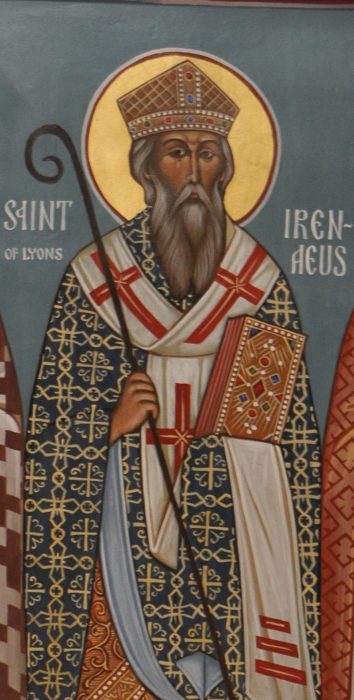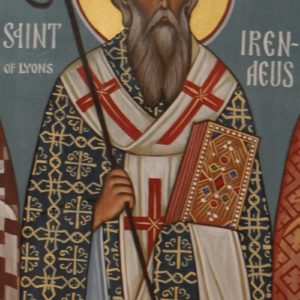
Guess who Pope Francis is going to name the newest Doctor of the Church? If you guessed “St. Irenaeus,” you are really good at reading titles. (If you guessed anything else, I am confused.) So who’s St. Irenaeus, what’s a Doctor of the Church, and does Irenaeus deserve this honor?
Since I mention Irenaeus over a hundred times in my new book* The Early Church Was the Catholic Church, Drew (one of the editors at Catholic Answers) asked me to unpack those questions a bit.
In the piece, I point out that Irenaeus (c. 130 – c. 203) is really important for theology, but also remarkable (and much needed) for his style and tone, and that he was revered as a Doctor of the Church even by other Doctors of the Church, like St. Augustine. Here’s a taste:
His legacy is not only one of orthodoxy and thoroughness, but also of gentleness. His name comes from the Greek word for peace and unity (eiréné), and Francis has chosen the title Doctor Unitatis (“doctor of unity”) for Irenaeus. When Francis’s predecessor Pope Victor I wanted to excommunicate all of the churches of Asia Minor for celebrating Easter on the wrong day, it was Irenaeus who convinced him to relent. As a bishop of what’s now Lyon, France, Irenaeus followed the Roman custom of celebrating Easter on Sunday. But he had grown up in the East, in Asia Minor, and so he knew that tying the dating of Easter to Passover was a practice instituted in those churches by the apostle John himself. With a foot in each world, Irenaeus was in a unique position to serve as a sort of mediator.
And so, as Eusebius recounts, Irenaeus “maintained that the mystery of the resurrection of the Lord should be observed only on the Lord’s day. He fittingly admonishes Victor that he should not cut off whole churches of God which observed the tradition of an ancient custom.” In other words, he conceded that the pope was right on the substance (Easter should be celebrated on Sunday) but also criticized him for overreacting, reminding him that earlier Christians were able to “live in peace with one another” despite their differing liturgical practices. Victor seems to have been convinced by Irenaeus’s entreaties, and Eusebius writes that “Irenaeus, who truly was well named, became a peacemaker in this matter, exhorting and negotiating in this way in behalf of the peace of the churches.” In an age in which Catholics are often guilty of thinking the worst of one another (including over liturgical matters), he’s a much-needed teacher today.
I didn’t explore this part directly, but I find it really fascinating that Pope Francis chose to uphold as the “Doctor of Unity” someone who “fittingly admonished” his pope when the pope was behaving badly. Make of that what you will, but I find it striking. Anyways, please feel free to read the whole thing!
*More on that soon…

“was a practice instituted in those churches by the apostle JOHN himself.”
Do you believe that Jesus was ~50 years old when he died?
(Against Heresies Book 2, Chapter 22, Paragraph 6)
“those who were conversant in Asia with JOHN, the disciple of the Lord, [affirming] that JOHN conveyed to them that information. And he remained among them up to the times of Trajan. Some of them, moreover, saw not only JOHN, but the OTHER apostles also, and heard the very same account from them, and bear testimony as to the [validity of] the statement. Whom then should we rather believe?”
Pope Francis has officially declared St. Irenaeus, 2nd-century bishop of Lyon, a Doctor of the Church, with the title “Doctor of Unity” in a decree issued on January 21, 2022.
Indulgences?
Another “doctrine having no foundation in Scripture”.
That’s a very fine line indeed, but still strong enough a hang a man.